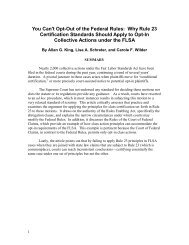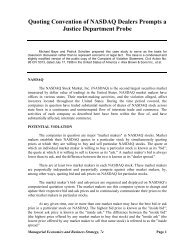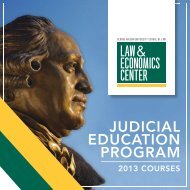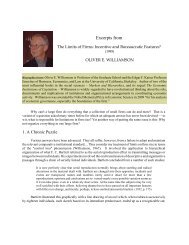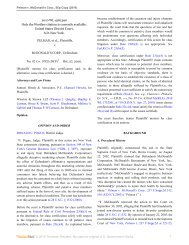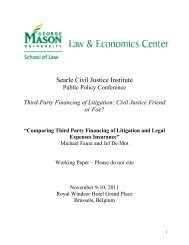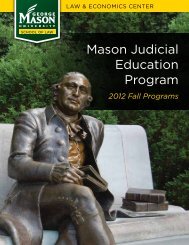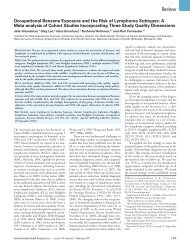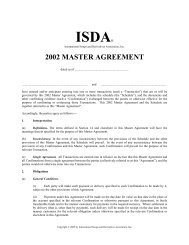CAPRON v. VAN NOORDEN
CAPRON v. VAN NOORDEN
CAPRON v. VAN NOORDEN
Create successful ePaper yourself
Turn your PDF publications into a flip-book with our unique Google optimized e-Paper software.
<strong>CAPRON</strong> v. <strong>VAN</strong> <strong>NOORDEN</strong><br />
Supreme Court of the United States, 1804.<br />
6 U.S. (2 Cranch) 126, 2 L.Ed. 229.<br />
Error to the [United States] circuit court of North Carolina. The<br />
proceedings stated Van Noorden to be late of Pitt county [in North<br />
Carolina], but did not allege Capron, the plaintiff, to be an alien, nor a<br />
citizen of any state, nor the place of hia residence.<br />
Upon the general issue, in an action of trespass on the case, a verdict<br />
was found for the defendant, Van Noorden, upon which judgment was<br />
rendered.<br />
The writ of error was sued out by Capron, the plaintiff below, who<br />
assigned for error, among other things, first, "that the circuit court<br />
aforesaid is a court of limited jurisdiction, and that by the record aforesaid<br />
it doth not appear, as it ought to have done, that either the said George<br />
Capron, or the said Hadrianus Van Noorden, was an alien at the time of<br />
the commencement of said suit, or at any other time, or that one of the<br />
said parties was at that or any other time, a citizen of the state of North<br />
Carolina where the suit was brought, and the other a citizen of another<br />
state; or that they the said George and Hadrianus were, for any cause<br />
whatever, persons within the jurisdiction of the said court, and capable of<br />
suing and being sued there." And, secondly, "that by the record aforesaid<br />
it manifestly appeareth that the said circuit court had not any jurisdiction<br />
of the cause aforesaid, nor ought to have held plea thereof or given<br />
judgment therein, but ought to have dismissed the same, whereas the said<br />
court hath proceeded to final judgment therein."<br />
Harper, for the plaintiff in error, stated the only question to be<br />
whether the plaintiff had a right to assign for error the want of jurisdiction<br />
in that court to which he had chosen to resort. * * *<br />
Here it was the duty of the Court to see that they had jurisdiction, for<br />
the consent of parties could not give it. * * *<br />
The defendant in error did not appear, but the citation having been<br />
duly served, the judgment was reversed.
MAS v. PERRY<br />
United States Court of Appeals, Fifth Circuit, 1974.<br />
489 F.2d 1396, certiorari denied 419 U.S. 842, 95 S.Ct. 74, 42 L.E:d.2d 70.<br />
AINSWORTH, CIRCUIT JUDGE.<br />
* * *<br />
Appellees Jean Paul Mas, a citizen of France, and Judy Mas were<br />
married at her home in Jackson, Mississippi. Prior to their marriage, Mr.<br />
and Mrs. Mas were graduate assistants, pursuing coursework as well as<br />
performing teaching duties, for approximately nine months and one year,<br />
respectively, at Louisiana State University in Baton Rouge, Louisiana.<br />
Shortly after their marriage, they returned to Baton Rouge to resume<br />
their duties as graduate assistants at LSD. They remained in Baton Rouge<br />
for approximately two more years, after which they moved to Park Ridge,<br />
Illinois. At the time of the trial in this case, it was their intention to<br />
return to Baton Rouge while Mr. Mas finished his studies for the degree of<br />
Doctor of Philosophy. Mr. and Mrs. Mas were undecided as to where they<br />
would reside after that.<br />
Upon their return to Baton Rouge after their marriage, appellees<br />
rented an apartment from appellant Oliver H. Perry, a citizen of Louisi·<br />
ana. This appeal arises from a final judgment entered on a jury verdict<br />
awarding $5,000 to Mr. Mas and $15,000 to Mrs. Mas for damages<br />
incurred by them as a result of the discovery that their bedroom and<br />
bathroom contained "two-way" mirrors and that they had been watched<br />
through them by the appellant during three of the first four months of<br />
their marriage.<br />
At the close of the appellees' case at trial, appellant made an oral<br />
motion to dismiss for lack of jurisdiction. The motion was denied by the<br />
district court. Before this Court, appellant challenges the final judgment<br />
below solely on jurisdictional grounds, contending that appellees failed to<br />
prove diversity of citizenship among the parties and that the requisite
SEc.B DIVERSITY OF CITIZENSHIP 279<br />
jurisdictional amount is lacking with respect to Mr. Mas. Finding no merit<br />
to these contentions, we affirm. Under section 1332(a)(2), the federal<br />
judicial power extends to the claim of Mr. Mas, a citizen of France, against<br />
the appellant, a citizen of Louisiana. Since we conclude that Mrs. Mas is a<br />
citizen of Mississippi for diversity purposes, the district court also properly<br />
had jurisdiction under section 1332(a)(l) of her claim.<br />
It has long been the general rule that complete diversity of parties is<br />
required in order that diversity jurisdiction obtain; that is, no party on<br />
one side may be a citizen of the same State as any party on the other side.<br />
Strawbridge v. Curtiss * * *. This determination of one's State citizenship<br />
for diversity purposes is controlled by federal law, not by the law of any<br />
State. * * * As is the case in other areas of federal jurisdiction, the diverse<br />
citizenship among adverse parties must be present at the time the<br />
complaint is filed. * * * Jurisdiction is unaffected by subsequent changes<br />
in the citizenship of the parties. * * * The burden of pleading the diverse<br />
citizenship is upon the party invoking federal jurisdiction * * * and if the<br />
diversity jurisdiction is properly challenged, that party also bears the<br />
burden of proof.<br />
To be a citizen of a State within the meaning of section 1332, a<br />
natural person must be both a citizen of the United States * * * and a<br />
domiciliary of that State. * * * For diversity purposes, citizenship means<br />
domicile; mere residence in the State is not sufficient. * * *<br />
A person's domicile is the place of "his true, fixed, and permanent<br />
horne and principal establishment, and to which he has the intention of<br />
returning whenever he is absent therefrom * * *." * * * A change of<br />
domicile may be effected only by a combination of two elements: (a) taking<br />
up residence in a different domicile with (b) the intention to remain there.<br />
* * *<br />
It is clear that at the time of her marriage, Mrs. Mas was a domiciliary<br />
of the State of Mississippi. While it is generally the case that the<br />
domicile of the wife-and, consequently, her State citizenship for purposes<br />
of diversity jurisdiction-is deemed to be that of her husband, * * * we<br />
find no precedent for extending this concept to the situation here, in<br />
which the husband is a citizen of a foreign state but resides in the United<br />
States. Indeed, such a fiction would work absurd results on the facts<br />
before us. If Mr. Mas were considered a domiciliary of France-as he<br />
would be since he had lived in Louisiana as a student-teaching assistant<br />
prior to filing this suit * * *-then Mrs. Mas would also be deemed a<br />
domiciliary, and thus, fictionally at least, a citizen of France. She would<br />
not be a citizen of any State and could not sue in a federal court on that<br />
basis; nor could she invoke the alienage jurisdiction to bring her claim in<br />
federal court, since she is not an alien. * * * On the other hand, if Mrs.<br />
Mas's domicile were Louisiana, she would become a Louisiana citizen for<br />
diversity purposes and could not bring suit with her husband against<br />
appellant, also a Louisiana citizen, on the basis of diversity jurisdiction.
280 THE COURT'S COMPETENCY CH. 4<br />
These are curious results under a rule arising from the theoretical identity<br />
of person and interest of the married couple. * * *<br />
An American woman is not deemed to have lost her United States<br />
citizenship solely by reason of her marriage to an alien. 8 U.S.C. § 1489.<br />
Similarly, we conclude that for diversity purposes a woman does not have<br />
her domicile or State citizenship changed solely by reason of her marriage<br />
to an alien.<br />
Mrs. Mas's Mississippi domicile was disturbed neither by her year in<br />
Louisiana prior to her marriage nor as a result of the time she and her<br />
husband spent at LSU after their marriage, since for both periods she was<br />
a graduate assistant at LSU. * * * Though she testified that after her<br />
marriage she had no intention of returning to her parents' home in<br />
Mississippi, Mrs. Mas did not effect a change of domicile since she and Mr.<br />
Mas were in Louisiana only as students and lacked the requisite intention<br />
to remain there. Until she acquires a new domicile, she remains a<br />
domiciliary, and thus a citizen of Mississippi. * * *<br />
lThe court's discussion of the jurisdictional amount is omitted.]<br />
Thus the power of the federal district court to entertain the claims of<br />
appellees in this case stands on two separate legs of diversity jurisdiction:<br />
a claim by an alien against a State citizen; and an action between citizens<br />
of different States. We also note, however, the propriety of having the<br />
federal district court entertain a spouse's action against a defendant,<br />
where the district court already has jurisdiction over a claim, arising from<br />
the same transaction, by the other spouse against the same defendant.<br />
* * * In the case before us, such a result is particularly desirable. The<br />
claims of Mr. and Mrs. Mas arise from the same operative facts, and there<br />
was almost complete interdependence between their claims with respect to<br />
the proof required and the issues raised at trial. Thus, since the district<br />
court had jurisdiction of Mr. Mas's action, sound judicial administration<br />
militates strongly in favor of federal jurisdiction of Mrs. Mas's claim.<br />
Affirmed.
§ 1331. Federal question<br />
The district courts shall have original jurisdiction of all civil actions<br />
arising under the Constitution, laws, or treaties of the United States.<br />
§ 1332. Diversity of citizenship; amount in controversy; costs<br />
[See the proposed Federal Courts Jurisdiction and Venue Clarification<br />
Act of 2011 that would modify§ 1332(a) and (c), in Part VIII, infra.]<br />
(a) The district courts shall have original jurisdiction of all civil<br />
actions where the matter in controversy exceeds the sum or value of<br />
$75,000, exclusive of interest and costs, and is between-<br />
(1) citizens of different States;<br />
(2) citizens of a State and citizens or subjects of a foreign state;<br />
239
28 § 1332 SELECTED PROVISIONS<br />
- -<br />
(3) citizens of different States and in which citizens or subjects<br />
of a foreign state are additional parties; and<br />
( 4) a foreign state * * * as plaintiff and citizens of a St:,.te or of<br />
different States.<br />
For the purposes of this section, section 1335, and section 1441, an<br />
alien admitted to the United States for permanent residence shall be<br />
deemed a citizen of the State in which such alien is domiciled.<br />
(b) Except when express provision therefor is otherwise made in a<br />
statute of the United States, where the plaintiff who files the case<br />
originally in the Federal courts is finaliy adjudged to be entitled to<br />
recover less than the sum or value of $75,000, computed without regard<br />
to any setoff or counterclaim to which the defendant may be adjudged to<br />
be entitled, and exclusive of interest and costs, the district court may<br />
deny costs to the plaintiff and, in addition, may impose costs on the<br />
plaintiff.<br />
(c) For the purposes of this section and section 1441 of this title-<br />
(1) a corporation shall be deemed to be a citizen of any State by<br />
which it has been incorporated and of the State where it has its<br />
principal place of business, except that in any direct action against<br />
the insurer of a policy or contract of liability insurance, whether<br />
incorporated or unincorporated, to which action the insured is not<br />
joined as a party-defendant, such insurer shall be deemed a citizen<br />
of the State of which the insured is a citizen, as well as of any State<br />
by which the insurer has been incorporated and of the State where<br />
it has its principal place of business; and<br />
(2) the legal representative of the estate of a decedent shall be<br />
deemed to be a citizen only of the same State as the decedent, and<br />
th.e legal representative of an infant or incompetent shall be deemed<br />
to be a citizen only of the same State as the infant or incompetent.




